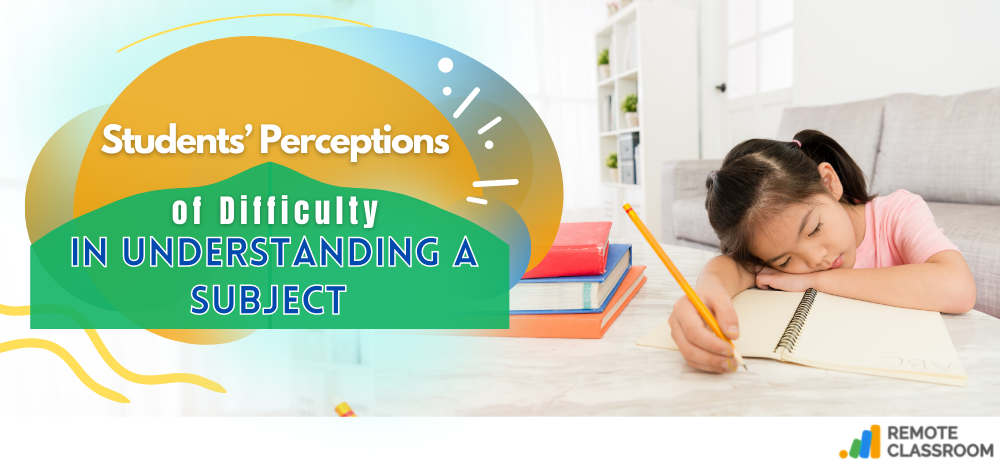Everyone has difficulty in understanding a certain subject at some point. Overcoming these obstacles is an important part of the learning process, particularly when you have a lot on your plate. These problems can range from minor hiccups to a long-term loss of motivation and productivity.

A student studying at his desk. Credit: monkeybusinessimages on iStock.
It may seem as if overcoming these issues requires exceptional determination, but the important thing is they can be resolved with the right mindset.
We address some of the most common study problems that can affect students having difficulty in understanding at any point of education, as well as some strategies for coping with them, in this article.
Factors that Influence Why Students Struggle to Learn a Subject
When it comes to coming up with new ways to describe something, the brain can be very imaginative. Students might reread a text passage and wonder why they have difficulty in understanding it instead of searching through the literature for a different answer to the same question.
1. Your child is lacking in inspiration.
One of the most difficult issues your child can face during your education is a lack of motivation.
The trick to understanding low motivation is to identify the causes; these causes are not always the same for all.

An unmotivated student sleeping at their desk. Credit: fizkes on iStock.
Low motivation may occur in specific subjects or across the board; some of the most common triggers include:
- They are tired and nervous, and they’ve got a lot on their plate.
- There are more interesting things to do
- They find the topic boring or for some other reason don’t like it.
- They dislike a particular subject’s instructor.
- They’ve got a lot going on in your life, so learning doesn’t seem important right now.
- They’re not feeling well, or you’re not getting enough sleep.
- They’re concerned about failing.
Your child will be in a stronger place to address your dilemma head-on once you understand what’s causing your lack of motivation and what can motivate you to succeed.
Factors affecting students’ academic performance. Video from Youtube.
Keeping some motivational quotes near their desk will also help them stay motivated when they’re feeling down. Eating sugary foods for breakfast, for example, will trigger a brief sugar rush that will make them feel active at first, but will quickly wear off. It might also leave them lethargic and unable to motivate yourself.
2. There are far too many sources of diversion.
It’s no surprise that many students are overwhelmed these days due to the abundance of external stimuli. If a handful of distractions are causing your child to lose focus, it’s time to shift their atmosphere to one that is more conducive to learning.

Little girl sitting on the sofa with a smartphone. Credit: Halfpoint on iStock.
Creating the best learning environment should be a reasonably simple solution for overcoming the power of all of these external distractions.
3. Your child finds it difficult to concentrate.
Concentration can be a big problem even after all distractions are removed. Losing concentration and experiencing a drastic drop in productivity is not only possible but also normal.
We’ve probably all experienced difficulty in understanding something, or the feeling of staring at a blank screen, unable to start writing, our minds wandering.

An upset kid doing homework. Credit: romrodinka on iStock.
Procrastination (among other things) is a symptom of a lack of focus. If your child find themselves continuously checking Facebook or texting while they should be studying, it’s a sure sign that they need to concentrate.
Difficulty focusing, like low motivation, can be triggered by a variety of issues. If they can’t focus because they’re thinking about something, try to clear your mind before you start working; otherwise, your productivity will suffer.

An Asian girl is using laptop at her desk. Credit: tylim on iStock.
It’s also worth noting that working too hard can cause trouble focusing. Give your child some time off if they’ve been studying to the bone and not getting enough rest. They’ll most likely return to your desk feeling revitalized and much more able to focus.
4. Your child has trouble recalling facts and statistics.
A common concern among students at any point in their education is that it is difficult to recall all of the details needed to effectively answer exam questions.

A girl trying to memorize. Credit: Hakase_ on iStock.
Learning things correctly the first time may aid their recall to come exam time, but if they have trouble remembering what they need to know, learning to use a few memory aids can help.
5. They are dissatisfied with the topic they are learning.
Your child will undoubtedly experience a topic they have difficulty in understanding at some point during their education. If they hate it because they find it tedious, or because they believe they aren’t very good at it, or because it seems to be a meaningless topic that they won’t use in the long run, or because they actively despise it, their dislike may have a significant effect on their performance in this subject.

An Asian child getting bored reading a book. Credit: Chinnapong on iStock.
A child might devote a little more time to improving their skills, and they could discover that they begin to enjoy it more.
6. They lack the right resources.
This is, by far, the most straightforward issue on the list.
Academic success is contingent on having access to the required tools. Whether they be books, facilities, an instructor with whom they can speak, or anything else they need to learn effectively.

A school girl is frustrated after several failed attempts while writing an essay. Credit: imtmphoto on iStock.
If your child needs something booked, ask their instructor for recommendations so they don’t accidentally go in the wrong direction with their learning.
7. You have difficulty managing your time.
Studying at any level necessitates good time management, and if your child is having trouble meeting deadlines, feeling frustrated with work, or finding themselves staying up late at night to finish a piece of homework, it’s a sign that they need to improve their time management skills.

A kid bored with studying at home. Credit: Zaikina on iStock.
This entails being more organized, maintaining a list of what needs to be done and when it needs to be done, and getting started on the homework as soon as it’s been assigned, rather than putting it off.
It also entails being more consistent with their routine, such as rising early, preparing their day ahead of time, and making the most of the time they set aside for each of your subjects.
Takeaway
We all learn in different ways; some of us tend to work in complete isolation, while others prefer to learn in groups; some people learn better by making diagrams and sketches, while others learn best by writing things down.
Experiment with different learning styles to see if you can find a better way to research – one that allows you to enjoy what you’re doing, retain knowledge more effectively, and concentrate more easily.

A young girl tired of studying. Credit: aylinnn on iStock.
A final point to consider: all of the issues we’ve addressed in this article can be solved by adopting the proper attitude.
Whatever study issues your child is having, a positive outlook will go a long way toward helping them get back on track. If they’re caught in a studying rut, let them take a break, clear their minds, and help them rethink their approach to their studies. It’ll make a huge difference.
Remote Classroom is not only a monitoring application that will help you in tracking your child‘s tasks and accomplishments, but we also have remote teachers that can assist your child in learning certain subjects they are struggling on. All you have to do is Sign up!
#remoteclassroomph
#remoteclassroom
#remotelearning
#remoteeducation
#remoteschools
#onlineteachers
#onlinetutoring
#virtualteaching
#lifeschooling
#intentionalschooling
#virtualclass
#onlinelearning
#homeschooling
#virtuallearning
#onlineschools

